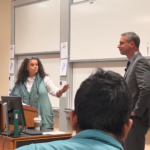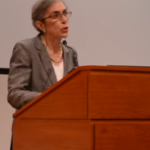Earth to Mann
Lewis Carroll died too soon. Just imagine the fun he’d have with the cliquish clan of climate catastrophe researchers who seek to control science, debate and public policy on global warming and energy – and then get outraged when someone challenges their findings, methodologies or integrity.
On October 1, Dr. Michael Mann of Pennsylvania State University and “hockey stick” fame published an angry riposte in Colorado’s obscure Vail Daily Voices (circulation 15,000), expressing his umbrage over an article that had appeared in the free coffee shop newspaper a day earlier.
“An individual named Martin Hertzberg did a grave disservice to your readers by making false and defamatory statements about me and my climate scientist colleagues in his recent commentary in your paper,” Mann began. (Hertzberg is a research scientist and former US Navy meteorologist.) The thin-skinned Penn State scientist then ranted:
“These are just lies, regurgitation of dishonest smears that have been manufactured by fossil fuel industry-funded climate change deniers, and those who do their bidding by lying to the public about the science.” [emphasis added]
Meanwhile, NASA scientist Dr. James Hansen, recipient of huge monetary awards for strident climate disaster claims, wants oil and coal company CEOs prosecuted for “crimes against humanity.”
So Mann and Hansen are honest scientists, trying to do their jobs. But Hertzberg and anyone else who questions the “imminent manmade climate change catastrophe” thesis are dishonest crooks, liars, Holocaust deniers, hired guns for fossil fuel interests, criminals threatening all humanity. Hertzberg’s views were defamatory, but Mann’s and Hansen’s accusations are mild, rational and truthful. Sure.
(Readers can find Mann’s letters* and lively discussions about them and Hansen on Dr. Anthony Watts’ WattsUpWithThat.com climate change website. Hertzberg’s letter appeared, mysteriously disappeared, then reappeared in the Vail Voices online archives as the controversy raged and ebbed.)
The bizarre saga gets even stranger when viewed alongside Dr. Mann’s kneejerk lawsuit against Dr. Tim Ball,* a Canadian scientist, historical climatologist and retired professor who has frequently voiced his skepticism about claims that hydrocarbon use and carbon dioxide emissions are the primary cause of climate change and present an imminent risk of widespread planetary cataclysms. Dr. Ball has analyzed Canadian and global climate history, and does not regard computer models as much more than virtual reality scenarios that should never be the basis for real-world public policy.
Dr. Ball had poked fun at Dr. Mann, playing word games that suggest the computer guy should not be at Penn State, but in a similarly named state institution. Unfortunately, Mann is not easily amused, as Dr. Ball should have known from the PSU professor’s testy reaction to the “Hide the decline” animation* and other spoofs* that various AGW “deniers” posted online.
Mann insisted that Dr. Ball’s little joke was libelous and took him to court. Mann’s legal principal seems to be that libel is fine only when he and Hansen practice the craft, albeit with far less good humor than others display. More importantly, Dr. Ball does not live or work in the United States.
US libel cases are governed by the First Amendment, “public figure” rules and other safeguards that ensure open, robust debate, and make it difficult and expensive to sue people over slights, affronts, insults, disagreements and jokes.
Canada, unfortunately, has more limited free speech protections. So Dr. Mike sued Dr. Tim in Canada, assuming victory would be rapid and sweet. Surprise! Dr. Ball decided to slug it out.
In Canada, the principal defenses against libel claims are that the alleged defamation constitutes “fair comment” or was in fact “the truth.” Ball chose the latter defense.
Doing so means the penalty for losing could be higher than under “fair comment” rules. But arguing that his statement was based on truth allows Dr. Ball to seek “discovery” of evidence that Dr. Mann’s actions reflect a use of public funds to alter or falsify scientific data, present highly speculative results as solid facts, or otherwise engage in something that a reasonable person would conclude constitutes dishonest activity or criminal culpability, undertaken moreover through the use of taxpayer funds.
Proving that will not be easy, especially since Mann has steadfastly refused to provide such potential evidence to anyone, including Virginia Attorney General Ken Cuccinelli. That evidence might include Climategate emails; computer codes and data used, misused or used selectively to generate global warming spikes in historical graphs; and questionable research or proposals used to secure additional government grants, misinform citizens or lawmakers, or promote costly or harmful public policies.
The US government alone spent an estimated $79 billion* on climate, renewable energy and related research between 1989 and 2009 – and many billions more since then. Obviously, there is a lot at stake for scientists, universities, government agencies and other institutions engaged in trying to demonstrate a link between human greenhouse gas emissions and climate, weather, agricultural, sea level and other “disasters.” The reputations and credibility of researchers and their institutions are likewise at stake.
Keeping people alarmed, insisting that numerous disasters will soon result from carbon dioxide emissions and a few degrees of planetary warming – and silencing anyone who questions climate chaos claims – are essential if this money train is to be kept on the tracks.
Dr. Mann is likely aided by Penn State lawyers, largely paid for with climate research taxpayer dollars the university wants to safeguard, by preventing criticism or scientific disclosure and transparency.
A judge and jury will decide the Mann vs. Ball case, after carefully weighing all the evidence on whether Dr. Ball’s allegations and insinuations were factual, accurate and truthful.
Dr. Mann’s research was conducted primarily with public money. It is being presented as valid, peer-reviewed science. It is also being used to champion and justify major policy recommendations at state, national and international levels. And those recommendations call for carbon taxes and other penalties for using hydrocarbon energy; the replacement of affordable, dependable fossil fuel energy with expensive, unreliable wind and solar facilities; a roll-back of living standards in rich developed nations; and limited or minimal energy and economic development in poor countries.
Therefore, as I have argued previously, the public has a right to demand* that Mann & Comrades show their work, not merely their answers and policy demands. Thus far, serious questions* about Mann’s research remain unanswered. The public also has a right to require* that Mann, Penn State & Company provide their source material, not just their results – along with anything else that may be relevant to gauging the validity, accuracy and honesty of the work and its conclusions and policy recommendations.




